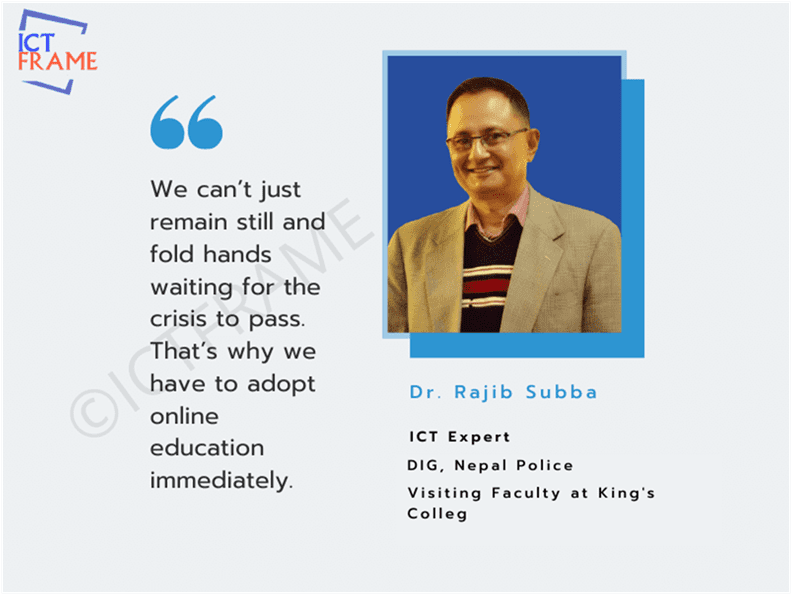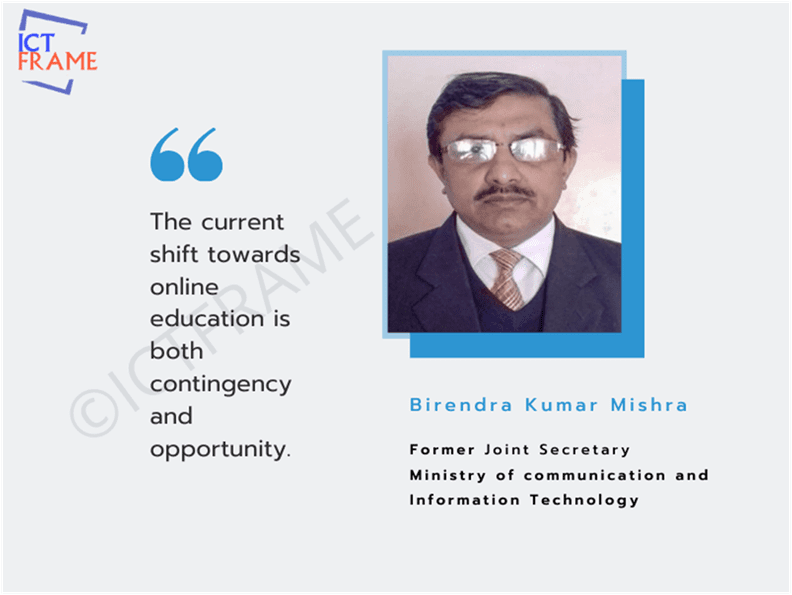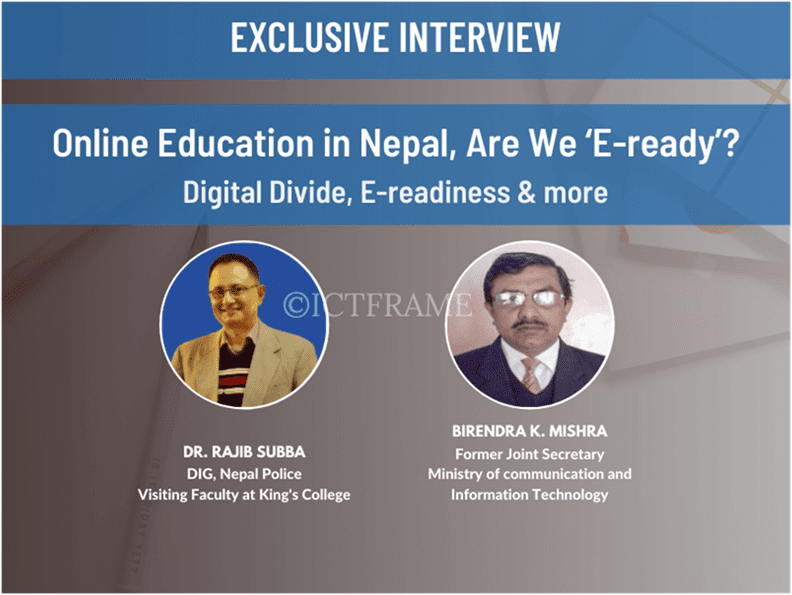Online Education in Nepal, Are We ‘E-ready’? E-readiness
27 April Kathmandu, 2020
The world is experiencing a shift towards online education, digital learning, and off-classroom activities. There are components in the online training that need addressing in order to implement a long-term strategy. But, is a developing country like Nepal ready to implement a 100% digital education system?
Even if it can, should we go 100% online with our educational curriculum?
It is where the concept of ‘e-readiness’ comes into play. It refers to a country’s capacity and state of preparedness to participate in the electronic word. (Definition from Wikipedia).
With the shift towards e-governance, we should be ready with the proper infrastructure. Digitizing the country means covering all 77 districts and remote areas eradicating the digital divide. However, experts believe that online classes may increase education inequality due to a lack of technology.
“Particularly for the low-income students where the online learning hasn’t been fully enabled because, you know, they don’t have the equipment or the connection or the teacher is not set up for it. The inequity has gotten greater in education,” – Bill Gates (Source: CNN)
This applies to every country in the world, especially in developing countries like Nepal. So a big question that arises is if Nepal is ‘e-ready’ for online education.
Let’s see what the experts have to say regarding this topic.
Interview with Dr. Rajib Subba – Nepal Police DIG & ICT Expert
Q. Do you think Nepal has the resources to implement Online Education successfully?
A: Around 7,50,000 students are currently deprived of formal education in Nepal due to the COVID-19 pandemic. Even if the lockdown is lifted, schools and colleges are not going to open up immediately. So, what do we do if lockdown extends for 3-4 months?
We can’t just remain still and fold hands waiting for the crisis to pass. That’s why we have to adopt online education, e-learning platforms, and virtual classes. In the current context of Nepal, people should understand the concept of online learning as off-classroom education.
Developing countries like us have already started online alternatives so why should we fall behind? To answer your question, I don’t believe any nation can implement 100% online education. However, to achieve somewhat successful online training in Nepal, we need to upgrade our infrastructure.
The proportion of mobile phone usage in Nepal is 143% of the population while the broadband internet is 72%. So, in terms of infrastructure and resources, we are almost ready, and we need to start taking action.
Q. How can we resolve the digital divide to make sure there is equality in online education?
A: Firstly, what we can do is evaluate the level and commonality of students. Then, we can use Zoom for higher-level students and maybe Google Meet, Hangout, or messenger for lower-level students. I teach Masters level students and some of my students are from remote areas but still are managing to attend my class.
Some of them have to search for good network coverage outside their home for that. But it might not be the same for junior students. So, we have to consider the level of students and finally select the technology or platform to conduct virtual classes.
We also have to equally focus on the asynchronous mode of delivery so that students can access the materials anytime. For the students who don’t have access to online platforms or coverage, we need to consider radio broadcast and telecasts. We have numerous radio stations in Nepal, why not use them?
For instance, if the board conducts classes for Class 10. if they can record the lesson and broadcast it or telecast it, every student will be able to access the information. Let’s assume more students are missing out then, we also have the capability to utilize postal service. In fact, we should also use Nepal Police’s HF radio as a solution for the current scenario.
So, we need to implement asynchronous modes and make sure we start right away instead of wasting time searching for a 100% online education strategy. Otherwise, as Bill Gates said, we will witness a rise in the digital divide in the country.

Q. What do you think are the requirements to take an initiative for conducting online classes?
A: Firstly, ICT has enabled us to take any initiative that is digital and online. Every nation in the world is doing it, and it has started in But surely, I realized that we would first need a team and plan counseling. We also need resources and select the online platform. If we work together and merge ideas, we can make it happen and include the majority of students in the process.
At the same time, we need to address the availability of resources for students and their financial status. So, if Universities like TU or KU implements full-fledged online education, we will come across a digital divide. To address this, we have to make sure to utilize every mode or means of communication possible.
Nepal as well. We have successfully done it in King’s College so why not elsewhere?
In addition, the professors and lecturers of several universities need to upgrade their level of ICT knowledge. Most of them aren’t prepared or trained to conduct online classes at all. So, guidelines need to be prepared and lecturers need to be pressurized to adapt to the changing environment.
Talking about the engagement in virtual classes, it’s not only students who need to be engaged but also the teachers and the parents. Personally, I start off my class with an ice-breaker and a quiz. I use an application called Kahoot! which enables an entertaining environment for students so that they get the best of both worlds during an online session.
Therefore, it depends on the lecturer to make the class interesting and interactive as well. For this, they need to be trained and adapt to the modern culture of online advancement.
You May Also Like: Tribhuvan University Issued Guidelines For Teaching Through Online Classes
Q. Is there any other way around the formal education system to make sure students are not deprived of education?
A: In some countries, I have found that students at lower-level never have to sit on exams. The teachers will give assessments on the basis of some assignments and that’s how they mark the progress of the students.
In fact, some people don’t even trust the formal education system in the US. Children are homeschooled and every basic education they receive is either from their parents or private tutor. Not saying that we need to think similar but maybe we can take a chapter out of this book.
So, if online education is possible with notes and content available on the internet, why is there a need to attend school? Assessment can be done based on assignments but what we want is the total participation of students in online classes. That’s why it is the need of the hour to go digital instead of waiting out the disaster.
Q. What do you think the Government and Telco sector should do to ensure student privilege?
A: Well, there is something called the RTDF fund which can be used to develop and upgrade the telecommunications sector. We can upgrade internet coverage and data plans to ensure the availability of networks throughout the nation. Similarly, why not plan certain discounts for students in data plans and the internet?
For instance, if students get a certain discount on public transport by showing their ID cards, they should be able to get discounts on the internet or data packs by verifying their ID.
You May Also Like: Online Education Initiative By TU & KU | Talks with Telco Industry For Better Infrastructure
Q. Can virtual classes replace regular physical classes?
A: The thing is virtual classes have existed long before the pandemic or the lockdown. During my Ph.D. in the USA, I needn’t necessarily attend regular classes. However, there were instances when I had to go to attend a lecture too.
So, we can plan on a hybrid model of communication and a blend in physical and online classes. The current scenario will have changed our behavior and practices regarding regular classes. Moreover, it will have changed the financial state of individuals and industries.
Hence, all these will affect the way of learning. But, virtual classes can’t replace the flavor of regular classes completely. I predict that we will engage more in virtual classes and limit our physical presence.
Q. What is your take on the possibilities of conducting LokSewa examinations online?
A: In my view, it might be difficult to completely switch LokSewa examinations online. However, it is obviously possible. If people can give IELTS, TOEFL, SAT, or GRE exams online by sitting all day in front of their PC, why not the same for LokSewa?
The only setback here can be the inability of people to use electronic devices for tests. But, there is a way to manage both modes depending on the capability of the candidates.
Q. What are your views on data and content security for online education?
A: Humans are innovative beings. To discourage identity theft or data leak, I have noticed the use of aliases (nicknames) and avatars. Besides that, it is extremely important to use secure and licensed platforms.
I agree that we have to take appropriate security arrangements but not so much in the case of content. For example, if we broadcast an online session via radio or TV, why need cybersecurity?
So, I believe if we choose a reliable platform and as long as we agree on broadcasting knowledge, we are safe from cyberthreats.
Interview with Birendra Mishra – Former Joint Secretary at Ministry of Communication and Information Technology
Q. How can we implement reliable online education in the context of Nepal at present?
A: Online education is urgent looking at the current scenario as a contingency plan. It existed long ago but Tribhuvan University (TU) showed very little enthusiasm regarding it in the past. However, now they are coming up with certain directives to adopt it.
We also have an open university that facilitates distance learning in Nepal. So, there is good potential for Nepal to implement better online education opportunities. However, the issue that has existed since the beginning is the connectivity issue.
Some rural areas still face this issue but the situation is much better compared to that in the past. Most important thing is to establish a reliable connection with the establishment of better infrastructure. For this, we need active participation from the Nepal government and Nepal Telecommunications Authority (NTA).
Another important factor is the familiarity of students, teachers, and management with online platforms. The high-level committee members also need to be properly trained to upgrade their ICT skills. And, we need to focus on implementing a user-friendly learning environment as well.
Q. Do virtual classes have the potential to replace physical classes?
A: Firstly, there is a difference in ease-of-use and simplicity of the resources between the two. There certainly are challenges to adapt to a new alternative of learning for students too. But as they get used to it, we also need to focus on the availability of resources.
Talking about the potential of virtual classes to replace physical classes, I don’t think it is completely possible. The level of interaction, enthusiasm, and concentration might not be the same. However, we can blend online classes into the traditional education process as a supporting factor.
Another thing is that virtual classes aren’t possible when it comes to practical lessons in engineering or other faculties. The monitoring of students closely might be relatively difficult as well.
The current shift towards online education is both contingency and opportunity. Therefore, students, lecturers, and universities are all inclined towards off-classroom alternatives.

Q. What are the challenges of online education in Nepal and how can we solve it?
A: There are several challenges since the education sector in the country has just started to look into the online alternatives. However, we won’t be able to find a solution as long as we don’t start using it. The pandemic and lockdown have forced us to take action in order to prevent risking the future of students.
There are other challenges like adaptation and user-friendly environments that we have to overcome. Some students may also lack resources like smartphones and computers. Similarly, internet and network coverage are lacking in rural areas.
The solution to this issue is investing in upgrading the telecommunication sector by utilizing the RTDF fund. That is how we ensure equal availability of resources and coverage for students throughout Nepal. Because, if we don’t capitalize on this opportunity, the issue will turn into a giant pit.
Q. What can be the negative aspects of online education?
A: I believe virtual classes will take away the opportunity to know and understand students properly. The attachment towards students that is possible with the traditional method may not be the same as the online method. So, if everyone started to focus only on virtual activities, the world may not flourish.
We have to consider the effects on families and society as well. For instance, if kids are engaged all day on electronic devices, their interaction with the family will reduce drastically. I am sure many parents will agree with this.
Do you think that Nepal is ready to implement 100% online education preventing the digital divide?
Let us know in the comments!
Related Articles
Fusemachines Launches AI-Enabled Classroom | Will AI Shape the Education Sector?
Online Classes Start in Samriddhi School For The New Academic Session 2077
Google Education Group Starts Training Schools For Online Education In Nepal







